英文论文大纲(案例)
英文作文提纲示范
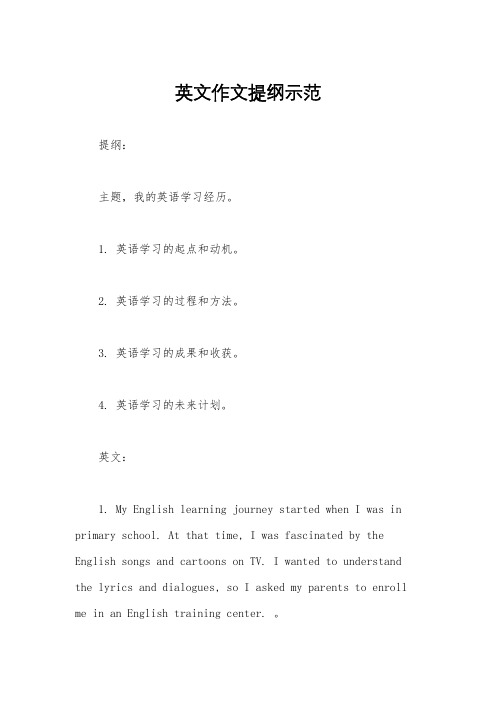
英文作文提纲示范提纲:主题,我的英语学习经历。
1. 英语学习的起点和动机。
2. 英语学习的过程和方法。
3. 英语学习的成果和收获。
4. 英语学习的未来计划。
英文:1. My English learning journey started when I was in primary school. At that time, I was fascinated by the English songs and cartoons on TV. I wanted to understand the lyrics and dialogues, so I asked my parents to enroll me in an English training center. 。
中文,我的英语学习之旅始于我上小学的时候。
那时候,我对电视上的英文歌曲和卡通片很着迷,想要理解歌词和对话,于是我请求父母让我去报名参加英语培训班。
2. In the beginning, I learned English mainly through memorizing vocabulary and grammar rules. However, I foundit hard to apply what I've learned in real-life situations. Later on, I realized that the key to mastering a languageis to practice speaking and listening. Therefore, I started to watch English movies and TV shows, listen to English podcasts, and speak with my foreign friends. 。
中文,一开始,我主要通过背单词和语法规则来学习英语。
英文论文(优秀4篇)
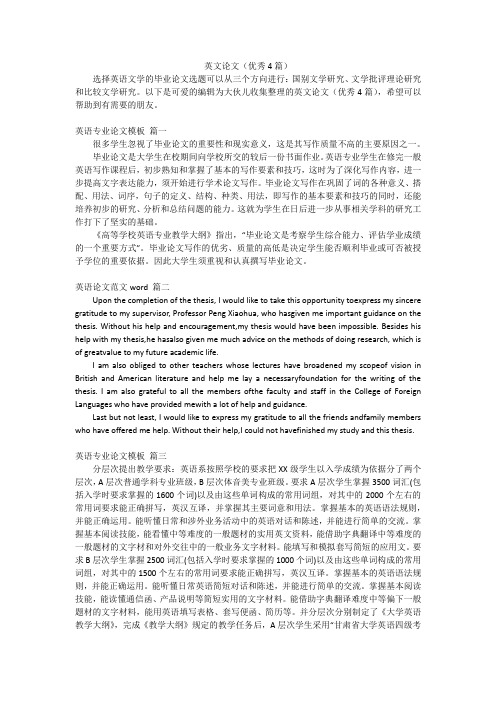
英文论文(优秀4篇)选择英语文学的毕业论文选题可以从三个方向进行:国别文学研究、文学批评理论研究和比较文学研究。
以下是可爱的编辑为大伙儿收集整理的英文论文(优秀4篇),希望可以帮助到有需要的朋友。
英语专业论文模板篇一很多学生忽视了毕业论文的重要性和现实意义,这是其写作质量不高的主要原因之一。
毕业论文是大学生在校期间向学校所交的较后一份书面作业。
英语专业学生在修完一般英语写作课程后,初步熟知和掌握了基本的写作要素和技巧,这时为了深化写作内容,进一步提高文字表达能力,须开始进行学术论文写作。
毕业论文写作在巩固了词的各种意义、搭配、用法、词序,句子的定义、结构、种类、用法,即写作的基本要素和技巧的同时,还能培养初步的研究、分析和总结问题的能力。
这就为学生在日后进一步从事相关学科的研究工作打下了坚实的基础。
《高等学校英语专业教学大纲》指出,“毕业论文是考察学生综合能力、评估学业成绩的一个重要方式”。
毕业论文写作的优劣、质量的高低是决定学生能否顺利毕业或可否被授予学位的重要依据。
因此大学生须重视和认真撰写毕业论文。
英语论文范文word 篇二Upon the completion of the thesis, I would like to take this opportunity toexpress my sincere gratitude to my supervisor, Professor Peng Xiaohua, who hasgiven me important guidance on the thesis. Without his help and encouragement,my thesis would have been impossible. Besides his help with my thesis,he hasalso given me much advice on the methods of doing research, which is of greatvalue to my future academic life.I am also obliged to other teachers whose lectures have broadened my scopeof vision in British and American literature and help me lay a necessaryfoundation for the writing of the thesis. I am also grateful to all the members ofthe faculty and staff in the College of Foreign Languages who have provided mewith a lot of help and guidance.Last but not least, I would like to express my gratitude to all the friends andfamily members who have offered me help. Without their help,I could not havefinished my study and this thesis.英语专业论文模板篇三分层次提出教学要求:英语系按照学校的要求把XX级学生以入学成绩为依据分了两个层次,A层次普通学科专业班级,B层次体音美专业班级。
英文专业毕业论文——黑暗的心
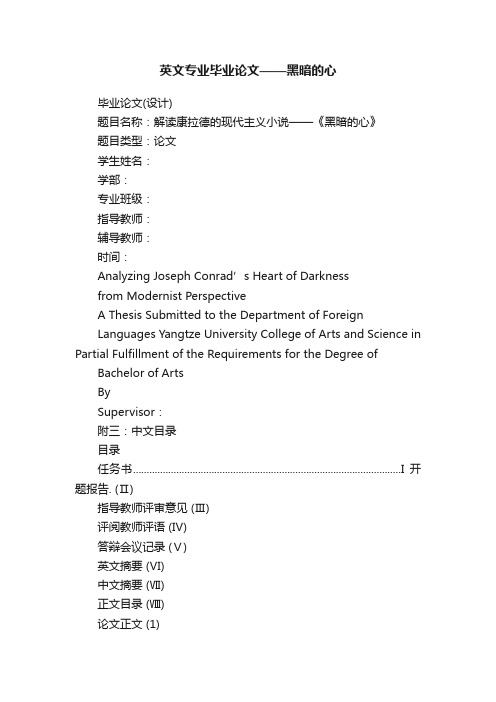
英文专业毕业论文——黑暗的心毕业论文(设计)题目名称:解读康拉德的现代主义小说——《黑暗的心》题目类型:论文学生姓名:学部:专业班级:指导教师:辅导教师:时间:Analyzing Joseph Conrad’s Heart of Darknessfrom Modernist PerspectiveA Thesis Submitted to the Department of ForeignLanguages Yangtze University College of Arts and Science in Partial Fulfillment of the Requirements for the Degree of Bachelor of ArtsBySupervisor:附三:中文目录目录任务书...................................................................................................I 开题报告. (Ⅱ)指导教师评审意见(Ⅲ)评阅教师评语(Ⅳ)答辩会议记录(Ⅴ)英文摘要(Ⅵ)中文摘要(Ⅶ)正文目录(Ⅷ)论文正文 (1)参考文献 (29)致谢 (31)附录一中文翻译 (32)附录二英文原文 (36)毕业论文(设计)任务书学部专业班级学生姓名指导教师/职称1.毕业论文(设计)题目:解读康拉德的现代主义小说-----《黑暗的心》Analyzing Joseph Conrad’s Heart of Darkness from Modernist Perspective2.毕业论文(设计)起止时间:2010年10 月11 日~2011年6月5日3.毕业论文(设计)所需资料及原始数据(指导教师选定部分)[1]Batchelor, John. The Life of Joseph Conrad, [M] Oxford UK & Cambridge USA:Blackwell, 1994.[2]Bradley, Candice.Af rica and Africans in Conrad’s Heart of Darkness, [M] London:Penguin Books Ltd, 2000.[3]Brown, Dennis. The Modernist Self in Twentieth—Century English Literature, [M] NewYork:St. Martin’s Press, 1989.[4]Conrad, Joseph. Heart of Darkness and the End of the Tether, [M] New York:AirmontPublishment Company, 1966.[5]Hampson, Robert. Joseph Conrad:Betrayal and Identity, [M] New York:St.Martin’sPress, 1992.[6]Krajka, Wieslaw. Isolation and Ethos-- Study of JosephConrad, [M] Boulder: EastEuropean Monographs, 1992.[7]Lothe, Jkob. Conrad’s Narrative and Method, [M] Oxford:Clarendon Press, 1989.[8]Peters, John. Conrad and Impressionism, [M] Cambridge:Cambridge University Press,2001.[9]Richetti, John. The Columbia History of the British Novel [M] Beijing: Foreign LanguageTeaching and Resarch Press, 2005.[10]S tape, J. H. The Cambridge Companion to Joseph Conrad, [M] Shanghai: ShanghaiForeign Language Press, 2000.[11]S herry, Norman.Conrad’s Western World, [M] Cambridge:Cambridge University Press,1971.[12]S tringer, Jenny. The Oxford Companion to Twentieth—century Literature in English, [M]Oxford:Oxford University Press, 1996.[13]W att, Ian. Impressionism and Symbolism in Heart of Darkness: A Commendation[M] .London: Macmillan. 1979.[14]侯维瑞, 现代英国小说史,[M] 上海:上海外语教育出版社,1985.[15]李彬, 康拉德《黑暗的心》中的现代主义元素,[J] 河北大学成人教育学院学报,2006(3) :14-16.[16]隋旭升,《黑暗的心脏》中库尔兹和马洛的象征意义,[J]《外国文学评论》,1994 (2):53-67.[17]姚兰,王颖, 试论《黑暗的心》中黑与自的象征意义,[J] 外国文学研究,2003(3):103-117[18]约瑟夫·康拉德黑暗的心灵,[M] 张和龙译,上海:上海外语出版社,1987.4.毕业论文(设计)应完成的主要内容1. 引言部分,介绍康拉德先生的生平事迹及其小说《黑暗的心》的背景和主要内容2. 文献综述3. 现代主义及其在《黑暗的心》中的运用3.1社会作用3.2《黑暗的心》中的叙述手法3.2.1 叙述框架3.2.2 叙述者3.3小说《黑暗的心》中印象主义艺术手法3.3.1康拉德与印象主义3.3.2 《黑暗的心》中对光的描绘3.3.3 《黑暗的心》中对颜色的描绘3.4 小说《黑暗的心》中象征手法的体现3.4.1 象牙的象征意义3.4.2 马洛的旅程的象征意义3.4.3 库尔兹的死亡的象征意义4. 现代主义手法下掩藏的异化、疏离和孤独意识4.1 人物的异化4.1.1 库尔兹4.1.2 弗利斯利文4.1.3 贸易站上的一群工作者4.2 异化导致的人际间的疏离4.2.1性别间的疏离4.2.2 种族间的疏离4.2.3 殖民者间的疏离4.2.4 黑人土著间的疏离4.3 基于疏离而产生的孤独意识4.3.1 库尔兹未婚妻的孤独4.3.2 库尔兹情妇的内心世界的绝望4.3.3 库尔兹临终前的忏悔5. 得出结论:康拉德抨击了殖民主义的黑暗,反映了现代人对世界个体的相对的理解及困惑,其现代主义的艺术手法对主题的表达卓有成效,其艺术价值对现代主义文学意义深远。
英语专业毕业论文写作教学大纲简介

*
教学方法及评估标准
01
课堂面授、课堂讨论、网络资源利用和互动
教学方法:
02
课堂出勤率8%,平时作业及课内外互动22%,毕业论文70%
教学评估:
03
< 60(不及格);60-69(及格);70-84(中等);85-92(良好);93-100(优秀)
评分标准:
*
毕业论文的基本概念
论文(Thesis) 选题(Subject) 论题(Thesis ) 主题(Theme) 话题(Topic) 提纲(Outline) 题目(Title)
*
《英语专业毕业论文写作》 教学大纲简介
第一讲:概念与要求 2011年2月23日
汇报人姓名
教学目的
了解英语专业毕业论文的基本要求
了解英语论文写作的不同过程
了解、掌握英语论文的选题和开题
了解、掌握英语论文的撰写规范
了解英语论文的评价标准
完成一篇5000字符合规范要求的英语毕业论文
01
03
02
04
05
选方向(Select a subject)
2
定题目(Choose a topic)
拟提纲(Write an outline) Weeks 2~3
写初稿(Draft) Weeks 5~7; 8~10; 11~13
复修改(Revise according to adviser)
定终稿(Finalize official copy) Week 14
*
语 言 学 语言与文化
语法(Grammar) 句法(Syntax) 词汇(Idioms, proverbs, prepositions, slangs, euphemism, net language) 比较(Languages)
毕业论文课程大纲(英文)

The graduation thesis course outline of Ocean university of China1 Course introduction1.Course descriptionGraduation thesis is a compulsory course for tourism management undergraduate students.This course inspects students theoretical knowledge and the level of student papers.It can help students improve personal ability.Graduation thesis is the important basis of the qualification of Bachelor.2.Design ideasThis course is to guide students according to the requirements , grasping the writing process of graduation thesis. Completing the reply by teaching progress.Finally,school will entry scores on the basis of the achievement of the paper.2 Course objectivesThis course aims to train college students to explore the truth, strengthening social consciousness and scientific research basic training.At the same time,it can improve the comprehensive practical ability and quality.Graduation thesis is an important teaching link is to realize the training goal,too.3 Learning requirementsProcedure1.Selecting topics and teachers2.writing the paper outline3.Writing the first draft according to the outline4.Modifying the draft5.Submiting the final draft By requiringRequirements1.Topic selection is consistent with professional direction.2.Listening to the guidance of teacher and modifying the paper according to the opinion.3.General requirementsEssays must conform to the principle of scientific, objective, viewpoints, and integrity.4 Teaching progress5 Reference materials and main reference book1.CurriculumDesigned to guide teaching material2.The resources[1] Peng Dingjin. Zhao Peiling. Academic paper writing a practical guide. Changsha:Central south university pressCentral south university press,2015[2]Lin Qingzhang..Academic paper writing instruction Beijing:Kyushu press.,2012[3]Duan Minglian, Zhang Jiuzhen,Li Fengtang. Degree thesis writing and the reference description specification.Beijing:Cambridge university press,2009[4] You Liqun ,Wang Xukun ,Y u Xianhong .Management class student graduation thesis writing and guidance.Hangzhou:Zhejiang university press; 2009[5]Gordon Harvey,College students' thesis writing instruction manual.Beijing:Education science press; 20076 Grade evaluation(1)The way of assessment C :A.closed-book exam B.Open bookC.thesisD.examineE.Other (2)Scoring system:7 Academic integrityLearning outcomes cannot be counterfeited, such as cheating in the exam, steal others learning outcomes.Otherwise, personal achievement will be canceled according to the relevant provisions of the learning of this course.。
【推荐】英文论文大纲范例-范文模板 (10页)
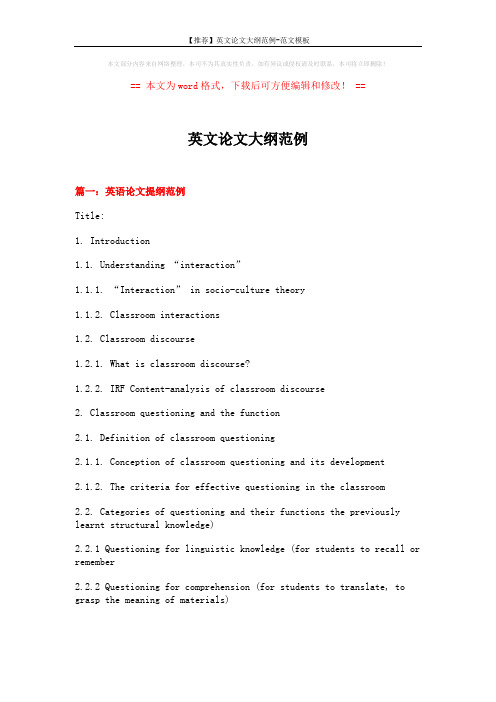
本文部分内容来自网络整理,本司不为其真实性负责,如有异议或侵权请及时联系,本司将立即删除!== 本文为word格式,下载后可方便编辑和修改! ==英文论文大纲范例篇一:英语论文提纲范例Title:1. Introduction1.1. Understanding “interaction”1.1.1. “Interaction” in socio-culture theory1.1.2. Classroom interactions1.2. Classroom discourse1.2.1. What is classroom discourse?1.2.2. IRF Content-analysis of classroom discourse2. Classroom questioning and the function2.1. Definition of classroom questioning2.1.1. Conception of classroom questioning and its development2.1.2. The criteria for effective questioning in the classroom2.2. Categories of questioning and their functions the previously learnt structural knowledge)2.2.1 Questioning for linguistic knowledge (for students to recall or remember2.2.2 Questioning for comprehension (for students to translate, to grasp the meaning of materials)2.2.3 Questioning for application (for students to generalize, or to use learnt materials in new and concrete situations)3. Investigation on classroom questioning3.1 Purpose and object of investigation3.2 Method of investigation4. Conclusion篇二:英语毕业论文的提纲样本本科毕业论文的提纲格式样例A Contextual Study of Black English摘要:对全文进行概括性的总结,涉及到研究背景、研究目的、研究方法、研究发现等;重点放在研究发现上。
英文作文提纲 范例

英文作文提纲范例提纲:主题,我的学习方法。
英文:As a student, I have tried many different study methods over the years. Some have worked well for me, while others have not. Here are the methods that I have found to be the most effective:1. Creating a study schedule: I find that I am most productive when I have a set schedule for studying. I block out specific times in my calendar for each subject andstick to it as much as possible.2. Taking breaks: It's important to take breaks when studying to avoid burnout. I usually take a 10-15 minute break every hour or so to stretch, get some fresh air, orhave a snack.3. Using flashcards: Flashcards are a great tool for memorization. I make flashcards for vocabulary words, formulas, and other important information that I need to remember.4. Practicing with past exams: Practicing with past exams is a great way to prepare for upcoming tests. It helps me to understand the types of questions that will be asked and to identify areas where I need to improve.5. Asking for help: If I am struggling with a particular subject, I am not afraid to ask for help. Whether it's from a teacher, tutor, or classmate, getting help can make a big difference in my understanding of the material.中文:作为一名学生,我在这些年中尝试了许多不同的学习方法。
《英语专业 毕业论文》教学大纲
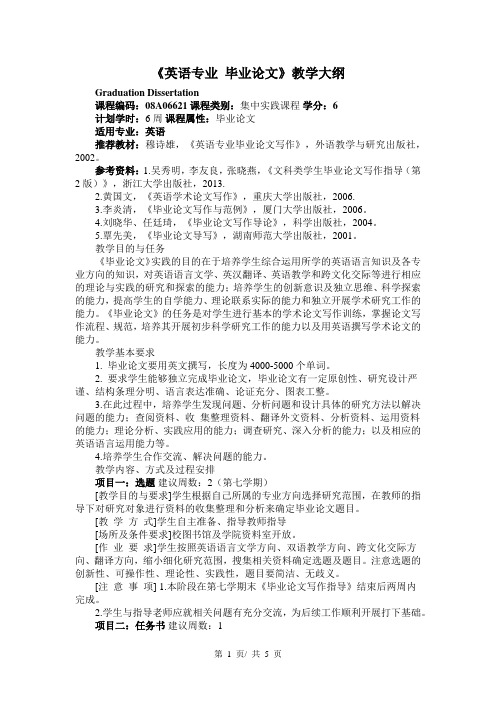
《英语专业毕业论文》教学大纲Graduation Dissertation课程编码:08A06621课程类别:集中实践课程学分:6计划学时:6周课程属性:毕业论文适用专业:英语推荐教材:穆诗雄,《英语专业毕业论文写作》,外语教学与研究出版社,2002。
参考资料:1.吴秀明,李友良,张晓燕,《文科类学生毕业论文写作指导(第2版)》,浙江大学出版社,2013.2.黄国文,《英语学术论文写作》,重庆大学出版社,2006.3.李炎清,《毕业论文写作与范例》,厦门大学出版社,2006。
4.刘晓华、任廷琦,《毕业论文写作导论》,科学出版社,2004。
5.覃先美,《毕业论文导写》,湖南师范大学出版社,2001。
教学目的与任务《毕业论文》实践的目的在于培养学生综合运用所学的英语语言知识及各专业方向的知识,对英语语言文学、英汉翻译、英语教学和跨文化交际等进行相应的理论与实践的研究和探索的能力;培养学生的创新意识及独立思维、科学探索的能力,提高学生的自学能力、理论联系实际的能力和独立开展学术研究工作的能力。
《毕业论文》的任务是对学生进行基本的学术论文写作训练,掌握论文写作流程、规范,培养其开展初步科学研究工作的能力以及用英语撰写学术论文的能力。
教学基本要求1. 毕业论文要用英文撰写,长度为4000-5000个单词。
2. 要求学生能够独立完成毕业论文,毕业论文有一定原创性、研究设计严谨、结构条理分明、语言表达准确、论证充分、图表工整。
3.在此过程中,培养学生发现问题、分析问题和设计具体的研究方法以解决问题的能力;查阅资料、收集整理资料、翻译外文资料、分析资料、运用资料的能力;理论分析、实践应用的能力;调查研究、深入分析的能力;以及相应的英语语言运用能力等。
4.培养学生合作交流、解决问题的能力。
教学内容、方式及过程安排项目一:选题建议周数:2(第七学期)[教学目的与要求]学生根据自己所属的专业方向选择研究范围,在教师的指导下对研究对象进行资料的收集整理和分析来确定毕业论文题目。
- 1、下载文档前请自行甄别文档内容的完整性,平台不提供额外的编辑、内容补充、找答案等附加服务。
- 2、"仅部分预览"的文档,不可在线预览部分如存在完整性等问题,可反馈申请退款(可完整预览的文档不适用该条件!)。
- 3、如文档侵犯您的权益,请联系客服反馈,我们会尽快为您处理(人工客服工作时间:9:00-18:30)。
The Outline of the Thesis (A Sample)Title:A Content-analysis of EFL Student-Teachers’ Questioning in the ClassroomAbstract: This paper introduces the difference in classroom questioning between EFL student-teachers and in-service teachers in middle schools by comparative analysis of their classroom discourse focusing on the features of student-teachers’questioning strategies (for linguistic knowledge, comprehension, application, analysis, synthesis, evaluation) in three aspects: (1) the purposes of questioning, (2) the waiting time for students’responses and (3) the feedback to students’responses. It aims at clarifying what’s lacking in student teachers’ classroom questioning skills & strategies and the reasons why they have the problems. The research may help EFL teachers understand classroom questioning and the way of classroom-teaching investigation by content analysis of classroom discourse is introduced.Key words: questioning; question types; waiting time; feedback1.Introduction1.1. Understanding “interaction”1.1.1. “Interaction” in socio-culture theory1.1.2. Classroom interactions1.2. Classroom discourse1.2.1. What is classroom discourse?1.2.2. IRF Content-analysis of classroom discourse2.Classroom questioning and the function2.1. Definition of classroom questioning2.1.1. Conception of classroom questioning and its development2.1.2. The criteria for effective questioning in the classroom2.2. Categories of questioning and their functions2.2.1 Questioning for linguistic knowledge (for students to recall or rememberthe previously learnt structural knowledge)2.2.2 Questioning for comprehension (for students to translate, to grasp themeaning of materials)2.2.3 Questioning for application (for students to generalize, or to use learntmaterials in new and concrete situations)2.2.4 Questioning for analysis (for students to discover the material into itscomponent parts so that it may be more easily understood)2.2.5 Questioning for synthesis (for students to compose, to put materialstogether, to form a new one)2.2.6 Questioning for evaluation (for students to judge the value of thematerial for a given purpose)3. Investigation on classroom questioning3.1 Purpose and object of investigation2.1.1 The purposes2.1.2 The object3.2 Method of investigation2.2.1 IRF (Initiate-Response-Feedback) analysis on classroom discourse2.2.2 The transcription of student-teacher’s classroom discourse2.2.3 The transcription of in-service teacher’s classroom discourse3.3 Procedures of investigation3.3.1 Investigation on student-teacher’s classroom questioning3.3.2 Investigation on in-service teacher’s classroom questioning3.3.3 The findings of the investigation2.3.3.1 Findings on student-teacher’s classroom questioning2.3.3.2 Findings on in-service teacher’s classroom questioning4. The analysis on the findings4.1 The difference in classroom questioning between EFL student-teachers and thein-service teachers4.1.1 Differences in the types of questions4.1.2 Differences in the waiting time for Ss’ responses4.1.3 Differences in T’s feedback to Ss’ responses4.2 Main problems of EFL student-teacher’s classroom questioning4.2.1 Lacking clear objectives4.2.2 Lacking patience for waiting4.2.3 Lacking clear points in feedbacks4.3 Analysis on student-teacher’s classroom questioning4.3.1 The teachers’ intention & effectiveness of classroom questioning4.3.2 The main cause for lacking patience & points in classroom questioning4.3.2.1 Deficiencies in teaching experience4.3.2.2 Deficiencies in understanding students4.3.2.3 Deficiencies in understanding the textbook5. Conclusion5.1 What’s lacking in EFL student-teachers’ classroom questioning5.2 The main reason of EFL student-teachers’problems in their classroomquestioning and the possible solutionsReferences[1] Breen, Michael. & Andrew, Littlejohn. (ed). Classroom Decision-Making.London: Cambridge University Press, 2000; rpt?. Shanghai: Shanghai Foreign Language Education Press, 2002.[2] Brown, G. & Yule, G. Discourse Analysis. London: Cambridge University Press,1983; rpt. Beijing: Foreign Language Teaching and Research Press, 2001.[3] Littlewood, William. Communicating Language Teaching. London: CambridgeUniversity Press, 1981; rpt. Beijing: Foreign Language Teaching and Research Press, 2000.[4] Littlewood, William. Foreign and Second Language Teaching. London:Cambridge University Press, 1990; rpt. Beijing: Foreign Language Teaching and Research Press, 2000.[5] McCarthy, Michael. Discourse Analysis for Language Teachers.London:Cambridge University Press, 1991; rpt. Shanghai: Shanghai Foreign Language Education Press, 2002.[6] Nunan, David. The Learn-Centered Curriculum---A Study in Second LanguageTeaching. London: Cambridge University Press, 1988; rpt. Shanghai: Shanghai Foreign Language Education Press, 2001.[7] Nunan, David. Research Methods in Language Learning. London: CambridgeUniversity Press, 1992; rpt. Shanghai: Shanghai Foreign Language Education Press, 2002.[8] Richards, Jack C. The Context of Language Teaching. London: CambridgeUniversity Press, 1998; rpt. Beijing: Foreign Language Teaching and ResearchPress, 2002.[9] Richards, Jack C. & David, Nunan. (ed). Second Language Teacher Education.London: Cambridge University Press, 1990; rpt. Beijing: Foreign Language Teaching and Research Press, 2000.[10] 王笃勤. 英语教学策略论. 北京:外语教学与研究出版社, 2002.[11] 鲁勤. 学会提问关注情感提升课质[J]. 中小学英语教学与研究, 2007年优秀论文专刊.[12] 姚喜红. 课是“问”出来的—初中英语课堂译文艺术初探[J]. 中小学英语教学与研究, 2007(2).[13] 杨春英. 初中英语教学中课堂有效提问的实施策略[J]. 中学外语教与学, 2007(9).[14] 王斌华. 英语教学中的提问艺术[J]. 中小学英语教学与研究, 2007(4).[15] 吴丽娇. 对课堂提问有效性的观察与研究[J]. 中小学英语教学与研究, 2007(5).。
